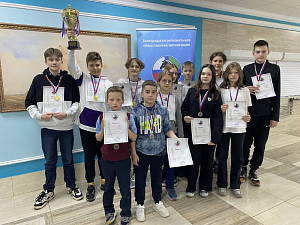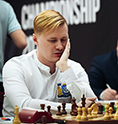Best Second Role
Dmitry Kryakvin sums up the outcome of the Russian Team Championships
The crucial final three rounds of the Premier League were expected to be tight and tense, but very few could have imagined that only one of the twelve (!) matches would end other than with a minimum winning score or a draw! Almost all teams had certain theoretical prospects for a medal, and otherwise no team wished to see itself as an underdog. All in all, no team has ended up without scoring at least one victory.
Suffice it to recall the derby of St. Petersburg teams that I mentioned in my previous review. Everything seemed to play into the hands of Mednyi Vsadnik, such as being several hundred points higher-rated at each board, performing quite well, and Andrey Esipenko's giving a hard time to Kirill Shubin right from the opening... However, the excellent starter Maxim Chigaev suddenly fails to Vasily Usmanov's vehement attack, Aleksey Goganov goes down as well... "SShOR" could have counted on winning the match altogether, if not for the presence in Vsadnik of a merciless filibuster, who managed to bring yet another victory after balancing "on the knife's edge".
Schekachikhin (“SShoR”) – Ponkratov (“Mednyi Vsadnik”)
Premier League, round 3
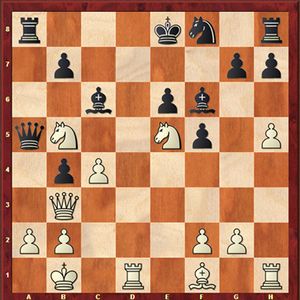
Maksim spent much time calculating the consequences of the knight check on d6, but still failed to find the way to oppose the opponent's knight transfer to c5. This is yet another instance of Ponkratov's spells in action! Frankly speaking, to calculate such a continuation in full in a team championship with its safely first rule is nearly unattainable.
Our task is easier as we are free to move pieces over the board: 21.Nd6+ Ke7 22.Nxc6+ bxc6 23.c5! (we absolutely have to train our guns on the е6-pawn) 23…Nd7 24.Bc4 Nxc5 25.Qe3. May we stop our calculation here? No way – 25…b3! 26.a3 Bxb2!
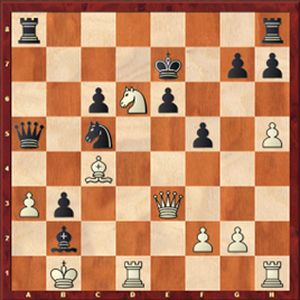
Capturing the b2-bishop is ill-advised, of course. 27.Nxf5+ Kf8 28.Qf4 Qxa3 gives White nothing better than a perpetual check. However, there is nothing permanent under the moon, including the knight's outpost on c5, and, following the dagger blow 27.Nb7! to deflect the knight from the defense of e6, not only does White gain material, but trades off the queen to get excellent winning chances.
Maxim, on the contrary, retreated the knight with 21.Nd3, giving the Flibustier's knight an outpost in an ideal timing: 21…Nd7 22.Nxb4 Nc5 23.Qa3 Qxa3 24.Nxa3 Ne4 25.Nd3 Nc3+ 26.bxc3 Rxa3. Schekachikhin's position was not yet hopeless, but the bishop pair brought success to Black and an overall match draw to Vsadnik.
Meanwhile, everything played into the hands of Moscow Chess Team's march to the top place. The tournament sidelines were full of terrible rumors that the team's management “went berserk” at the finish streak and halved players' fees to instill some anger! I do hope that this is just rumors, but the award ceremony indeed saw “joy mixed with tears” on Moscow team members' faces. I believe that justice will prevail and that the reward will find its heroes.
Thus, Valery Sviridov went down to Boris Grachev literally for no reason at all, and soon after Mikhail Demidov chalked up the victory to make for Alexander Motylev's defeat from Rudik Makarian. The only thing to do was not go down to Vsadnik, and everything worked perfectly well for the Moscow Chess Team in this regard, too: the St. Petersburg team decided to replace Chigaev and Goganov, and the decisive battle was joined by Valerij Popov without any prior warmup.
The pairing "I. Popov - V. Popov" was undoubtedly in the limelight of Premier League's round six. However, unfortunately for the Vsadnik fans, Valerij Popov's game fell apart: Ivan Popov had a very good opening choice to steer away from his opponent's preparation and win the game in 19 moves. Of course, the 2021 national champion could not give up the match just like that – the rock-solid Pavel Ponkratov restored the status quo almost instantly, and Sergei Lobanov of St. Petersburg was almost winning on board six, but went wrong at the last moment.
Lobanov (Mednyi Vsadnik) — Demidov (Moscow Chess Team)
Premier League, round 6
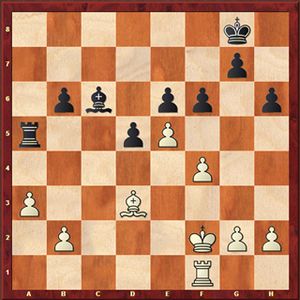
The fresh grandmaster from the banks of the Neva gradually outplayed Mikhail Demidov, but burned too much clock along the way. When calculating the consequences of 26.Rc1 Rc5 27.Rxc5 bxc5, Sergey must have missed the subtle 28.Ba6!, paving the way for the b-pawn. Thus, White has all chances to win the game after 28...Kf7 29.b4 cxb4 30.axb4 Ke7 31.b5 Be8 32.b6. 28…c4 29.Ke3 Kf7 30.Kd4 is not any better since the white centralized king is going to be a real challenge for Black.
However, the position arising after Ba6! is far from classifying as a technical conversion, and Demidov would have undoubtedly fought to the last bullet. In the game he escaped with slight shock. A draw was agreed after: 26.Re1 Kf7 27.g3 fxe5 28.fxe5 Ke7 29.Ke3 Be8 30.Re2 Rc5 31.Re1 Ra5 32.Re2 Rc5.
As we already know, the Moscow team only needed a draw against Mednyi Vsadnik, but Evgeniy Najer had white pieces on board one. Evgeniy's nerve and excellent athletic form is something to praise as his opponent — a 2700-rated player who is two and a half decades his younger and has recently defeated Carlsen at that — could nonetheless do nothing against the native of Moscow!
Najer (Moscow Chess Team) — Esipenko (Mednyi Vsadnik)
Premier League, round 6
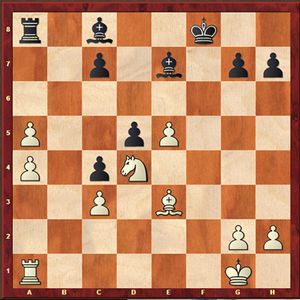
It seems nearly impossible to take Esipenko by surprise even by employing various cunning ramifications of Ruy Lopez, but the exchange of queens still leaves Black with certain problems to solve. It is time to bail out, and the most reliable way to do is was probably via an immediate elimination of the knight 20...Bc5 21.Rb1 Bxd4 22.Bxd4 Ke7. To play for a win requires White to part with the a-pawn sooner or later, and Black will have enough time to consolidate his forces in the meanwhile. On the contrary, Esipenko decided to do away with the pawn immediately, which gives the opponent's rook enough time to join the game.
20...Rxa5?! 21.Rb1! Ra8
The black pieces turn out to be utterly misplaced and always on the line to either forks or checks. In an attempt to hold the fort the engine votes for 21...Bd7 22.Rb8+ Kf7 23.Rb7 Ra6 24.Rxc7 Ke8. However, even this line has much unpleasant efforts in store for the black pieces to fight back from the last two ranks.
22.Nb5 Kf7 23.Nxc7 Ra5 24.Ra1 Bd8 25.Bb6 Bxc7 26.Bxc7 Ra7 27.Bb6 Ra6 28.a5 Ke6 29.Rf1
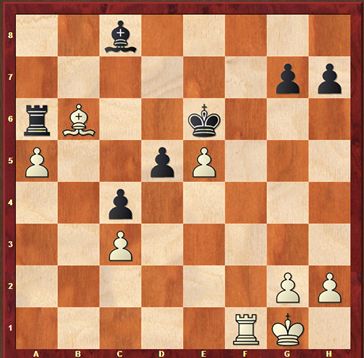
29…d4
Esipenko failed to keep his nerve in check as he was unwilling to play the position arising after 29...Kxe5 30.Rf8 Bf5 31.Kf2. However, the pawn sacrifice achieves nothing as White has all the time in the world to rearrange his pieces at his convenience.
30.cxd4 Ra8 31.Kf2 Kd5 32.Ke3 Be6 33.Kd2 Kc6 34.Kc3 Kb5 35.Rb1+ Kc6 36.Bc5 Ra6 37.Rb8 Bd5 38.Bb6 , followed by Rd8, and Evgeny Najer sealed the Russian championship gold medals for the Moscow Chess Team with one round to go!
The Moscow team would not aim at the absolute result and instead made a calm draw with the "Southern Ural" in the last round, while the contest for silver and bronze was yet in full swing. The Botvinnik School and Mednyi Vsadnik met in a key matchup, and, in fact, the loser was yielding his place in the top three to the KPRF team, if, of course, KPRF were to outplay Ladya. The match draw would have landed the Moscow team in the second place, and the match started in their favor with four quick draws. However, in the end, Andrey Esipenko, eager to rehabilitate himself, managed to find a way to outwit Gabriel Sargsyan, thus securing silver medals to the team from the banks of the Neva River. Well, Mednyi Vsadnik failed to defend the title this time around, and I believe that the following championship will be all the more interesting for this particular reason!
The Botvinnik School could only hope on some sort of KPRF's failure, but this time the KPRF had everything under control, and even slightly more than that when their powerful last board, Vadim Zvjaginsev, delivered a decisive strike.
Zvjaginsev (KPRF) — Faizrakhmanov (Ladya)
Premier League, round 7
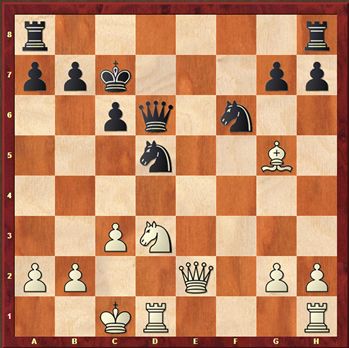
Vadim has once again come up with an interesting opening idea to revive the "extreme Caro-Kann", after which it was only a matter of technique to press advantage home.
20.Bh4!
This is a retreat, but a very powerful one. The threat of Bg3 is extremely hard to parry. Ramil opted for 20…Qe7, but the trade of queens 21.Qxe7+ Nxe7 22.Nc5 Ned5 23.Ne6+ did not make Black's life any easier. Faizrakhmanov went deathwards with 23…Kb6, and was checkmated after 24.c4 Ne3 25.Rd3 Nxg2 26.Bf2+ Ka5 27.Bc5 — Black cannot stay in the game even one move longer.
KPRF's bronze was not the only medal for the communists. A member of the Yugra team and the current member of the communist party, Marina Guseva, is the country's reigning women's champion. The women's section winner was in fact determined already after round seven when the Yugra team broke away from their pursuers by as much as 4 team points, and the intrigue for Yugra came down only to the possibility of finishing with an unblemished score. Guseva, as we remember from the previous report, has already brought her team the most important victory in a key matchup against Moscow Chess Team, and in the last two rounds she again scored two important victories to achieve an outstanding result of 6.5 out of 7 points!
Guseva (Yugra) — Kleymenova (Starlets)
Russian Women's Team Championship, round 8
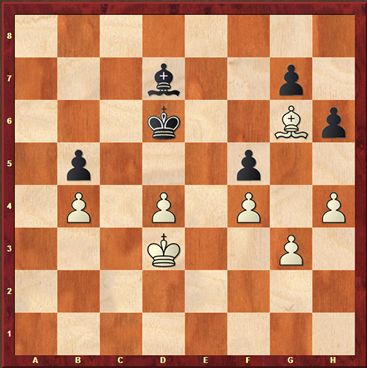
White is up a pawn, but it can take a long time to convert: it is very hard for White to break through, and, for example, after 46…Ke6 Guseva would have needed to work hard to outplay her opponent. However, after Kleymenova's 46...Be6? the seasoned Guseva would never let her opportunity go with – 47.d5! It turns out that 47…Kxd5 fails to 48.Be8, winning back the b-pawn and creating a remote passer. Kleymenova opted for 47…Bxd5, but after 48.Bxf5 Bf3 49.Kd4 Bg2 50.Bd3 Bc6 51.g4 the kingside pawns started their gradual advance. Black resigned 20 moves later.
All in all, the hallmark of this Russian championship (in all sections!) was a hot battle between the leader's pursuers, rather than by a struggle for gold. It would seem that after 4:0 in a face-to-face encounter between the Moscow Chess Team and Southern Ural-1, the female team of Moscow should easily keep the second line in the table, or even compete for gold. However, after the rest day the Moscow Chess Team unexpectedly starts with three draws in a row against the Moscow Oblast, St. Petersburg and Ladya! Maxim Shusharin's team, on the other hand, began collecting all points to be had, finishing with 13.5 out of 16 individual points in the last four rounds!
Of course, the role of Southern Ural's coach Yuri Yakovich cannot be overstated — he played table tennis, fixed and fetched coffee to his students, exhausted by intense many-day struggle and intensive opening preparation, of which Yuri Rafailovich is such a great connoisseur!). Some arbiters even suspected Yakovich of violating the captain's rule and leaving the playing hall in the middle of the round (from where did coffee arrive in the first place?), but the coach explained that he had everything prepared in advance and that he only escorted the student to the door.
I will add that there existed problems with the regulations compliance in the tournament hall. At some point I spot a man with a phone in his hands in the playing hall while the round is still going on! With a phone in his hands, believe it or not! Can it be true? And he is watching something in it (a broadcast?). That said, no one seems to care at all. Of course, I immediately informed one of the arbiters, which stopped this blatant misbehaviour immediately. And then the ethics committee convenes to discuss who blamed whom for the tips. The team championship is about providing the anti-cheating security, to begin with.
Solozhenkina (Southern Ural - 1) — Usacheva (Moscow Oblast)
Russian Women's Team Championship, round 8
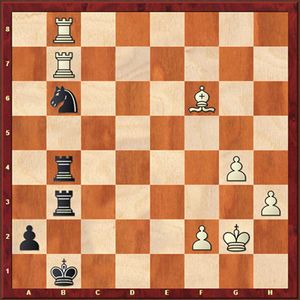
It is an extreme challenge to find your way through such maze of endgame complications, especially in time pressure, and Glafira Usacheva failed to do this as well. It turns out, that after 54...Nd5! 55.Rxb4 Rxb4 56.Rxb4+ Nxb4 the resourceful knight is in time to stop the opponent's pawns and help in promoting his own one. Thus, after 57.g5 Nd3 58.g6 Nf4+ the knight is well-placed to do away with the opponent's passer, and in case of 57.h4 Nd5! 58.Bd4 Kc2 59.h5 Nc3 60.h6 a1Q 61.h7 Qd1 the game ends in a perpetual check.
In contrast to the above said, Usacheva decided to queen her pawn right away – 54...a1Q? 55.Bxa1 Kxa1, at which point it became clear that the pieces arrangement along the b-file is an unbreakable chain and that, in fact, these pieces have no say in the future game development. After56.g5 there was no stopping the white pawns: 56…Rb5 57.h4 Kb2 58.g6 R3b4 59.Kg3 Rb3+ 60.f3 – and Solozhenkina has added yet another point for the Southern Ural team.
However, the utmost hail-biter happened in the Higher League. The Russian Chess School team, which was seed number two, started the tournament on a bad foot – GM Dmitry Kryakvin looked somewhat tired, and the team leader Dmitry Gordievsky succumbed to time pressure. However, in the second half the GMs bounced back, and the talented youth, represented by Aleksey Grebnev and Savva Vetokhin, propelled the team forward so that the Russian Chess School began winning each and every match.
In the last round the Russian Chess School was paired against the heroic Inleksis. The team of Voronezh worked wonders was on top of the tournament standings. The mighty Novosibirsk was doing its best to qualify into the Premier League (Maletin, Bocharov and comrades ended up taking 1st place), and the second team of Maxim Shusharin was pursuing the group of leading teams, proving its mettle by winning the last match with a 4-0 score. The Russian Chess School team needed to outplay the team of Voronezh with a 3:1 score.
The match beginning turned out catastrophic for the pursuers - their photographer and correspondent mixed up the moves order in the analysis and ended up in a hopeless position, whereas positions on other boards promised no victories. However, Vetokhin managed to eventually grind his opponent down in rook ending! That said, Grebnev and Gordievsky performed a real miracle! Gordievsky forced the bullet-proof Chekhov to resign on move 119, and Grebnev created a chess problem over the board that can be found not even in Mark Dvoretsky's manuals.
Grebnev (RCS) — Aminov (Inleksis)
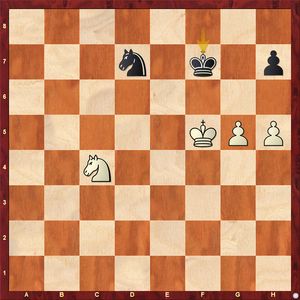
The knight ending “two vs one” seems to be entirely void of any winning ideas. According to Shereshevsky, Grebnev shifted back and forth for a long time to lull his opponent, who was otherwise shining in the tournament.
88.h6 Nc5
A stalemate often comes to Black's rescue: 88...Nf8 89.Ne5+ Кg8 90.Кf6 Кh8 91.Кf7 Nd7; 88...Кg8 is also reliable.
89.Ne5+ Кg8?
Now Black needed to come up with a study-like solution: 89...Кf8! 90.g6 Кg8 91.g7 Ne6! Much to the shock of the big Voronezh delegation, Aminov's position is now lost.
90.g6 Nb7
90...hg+ 91.Кхg6, and the pawn queens.
91.Nf7! Nc5 92.Ng5 Nb7 93.g:h7+ Кh8 94.Кf6!
The last nuance — 94.Кg6? Nd6. Now it is Black who is in zugzwang.
94...Nd6 95.Кg6 Black resigned.
Thus, Novosibirsk and the Russian Chess School have qualified into the next year's Premier League! I hope that this time the League will gather 10 teams.














